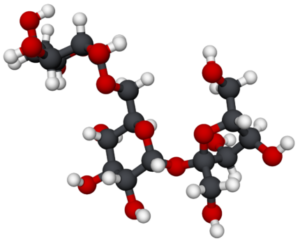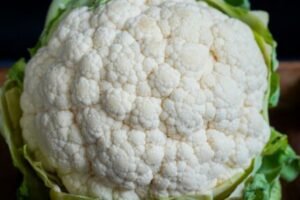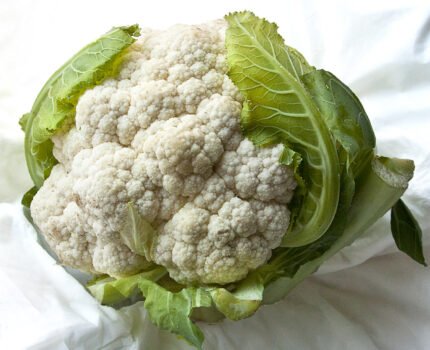Medically reviewed by Dr. Ramesh Gaddam, M.D. — Written by Sumalatha, D.N.H.E
Yes, cauliflower can cause gas and bloating in some individuals. Cauliflower belongs to a group of vegetables known as cruciferous vegetables, which also includes broccoli, cabbage, and Brussels sprouts. These vegetables contain complex carbohydrates called raffinose and fructans, as well as fiber. These components can be difficult for some people to digest, leading to gas production and bloating.
Gas and Bloating Components in Cauliflower
1. Fiber:

Cauliflower is a rich source of dietary fiber, which is beneficial for digestive health. However, high-fiber foods can sometimes cause gas and bloating, particularly if your digestive system isn’t used to processing large amounts of fiber.
The fiber in cauliflower passes through the digestive tract relatively intact, where it is fermented by bacteria in the colon, producing gas as a byproduct.
2. Raffinose:

Cauliflower contains raffinose, a complex sugar that humans lack the enzymes to digest.
When raffinose reaches the large intestine undigested, it is fermented by bacteria, leading to the production of gas.
3. Fructans:
Fructans are another type of carbohydrate found in cauliflower. Similar to raffinose, fructans can be difficult for some people to digest fully.
When fructans are fermented by bacteria in the colon, they can produce gas, leading to bloating and discomfort.
Tips to Reduce Gas and Bloating
While cauliflower can cause gas and bloating in some individuals, there are several strategies you can try to minimize these effects:
1. Cook Cauliflower Thoroughly:
Cooking cauliflower can help break down some of the indigestible carbohydrates, making it easier to digest and reducing the likelihood of gas and bloating compared to consuming it raw.
Roasting, steaming, or sautéing cauliflower are all effective cooking methods.
2. Start with Small Portions:
If you’re new to eating cauliflower or have a sensitive digestive system, start with smaller portions and gradually increase your intake over time.
This can help your digestive system adjust to the higher fiber content and reduce the risk of gas and bloating.
3. Chew Thoroughly:
Chewing your food thoroughly can aid in the digestion process and help prevent gas and bloating.
Take your time to chew each bite of cauliflower thoroughly before swallowing.
4. Pair Cauliflower with Digestive Aids:
Pairing cauliflower with digestive aids such as herbs (e.g., ginger or fennel), digestive enzymes, or probiotics may help improve digestion and reduce gas and bloating.
5. Monitor Your Intake:
Pay attention to how your body reacts to cauliflower and other cruciferous vegetables.
If you notice that cauliflower consistently causes gas and bloating, consider limiting your intake or avoiding it altogether.
6. Consider Low-FODMAP Alternatives:
If you experience significant digestive discomfort after consuming cauliflower, you may want to explore low-FODMAP alternatives that are less likely to cause gastrointestinal symptoms.
Conclusion
While cauliflower is a nutritious vegetable, it can cause gas and bloating in some individuals due to its high fiber content and certain carbohydrates.
By cooking cauliflower thoroughly, starting with small portions, chewing thoroughly, and monitoring your intake, you can help reduce the risk of gas and bloating and enjoy the health benefits of this versatile vegetable.
If digestive issues persist or worsen, consult with a healthcare professional for personalized advice.
Cauliflower Overview
Cauliflower is a versatile vegetable belonging to the Brassica oleracea species, which also includes broccoli, cabbage, and kale. It is characterized by its compact, white head, known as the “curd,” which is surrounded by green leaves.
However, there are also colorful varieties, such as orange, purple, and green cauliflower, which are gaining popularity for their vibrant appearance and slightly different flavor profiles.
Nutrition of Cauliflower
Cauliflower is a nutritious vegetable packed with essential vitamins, minerals, and antioxidants. Here’s a breakdown of the nutrition profile of cauliflower per 100 grams, according to the USDA:
| Nutrient | Amount per 100g | Daily Value (%) |
|---|---|---|
| Calories | 25 kcal | |
| Protein | 1.92 g | |
| Carbohydrates | 4.97 g | |
| – Dietary Fiber | 2 g | 8% |
| – Sugars | 1.91 g | |
| Fat | 0.28 g | |
| Vitamin C | 48.2 mg | 80% |
| Vitamin K | 15.5 mcg | 19% |
| Folate | 57 mcg | 14% |
| Vitamin B6 | 0.184 mg | 9% |
| Pantothenic acid (Vitamin B5) | 0.667 mg | 7% |
| Potassium | 299 mg | 9% |
| Manganese | 0.155 mg | 8% |
| Magnesium | 15 mg | 4% |
Health Benefits of Cauliflower
Cauliflower offers numerous health benefits due to its rich nutrient profile and potential medicinal properties.
Here are some of the key health benefits associated with consuming cauliflower:

Nutrient Dense:
Cauliflower is low in calories but high in vitamins, minerals, and antioxidants, making it a nutritious addition to any diet.
Rich in Antioxidants:
Cauliflower contains various antioxidants, including vitamin C, beta-carotene, and phytonutrients like glucosinolates and flavonoids.
These antioxidants help combat oxidative stress and reduce the risk of chronic diseases such as cancer, heart disease, and inflammation.
Supports Digestive Health:
Cauliflower is a good source of dietary fiber, which promotes digestive health by supporting regular bowel movements, preventing constipation, and maintaining a healthy gut microbiota.
Anti-inflammatory Properties:
The antioxidants and anti-inflammatory compounds in cauliflower may help reduce inflammation in the body, potentially lowering the risk of inflammatory conditions such as arthritis, inflammatory bowel disease (IBD), and cardiovascular disease.
Heart Health:
Cauliflower contains compounds like sulforaphane and kaempferol, which have been associated with improved heart health by reducing inflammation, lowering cholesterol levels, and supporting healthy blood pressure.
Cancer Prevention:
Some studies suggest that the compounds found in cauliflower, particularly glucosinolates and sulforaphane, may have anti-cancer properties by inhibiting the growth of cancer cells and reducing the risk of certain types of cancer, including breast, prostate, colon, and lung cancer.
Bone Health:
Cauliflower is a good source of vitamin K, which plays a crucial role in bone metabolism and may help reduce the risk of osteoporosis and bone fractures.
Weight Management:
With its low calorie and carbohydrate content, cauliflower can be a useful addition to weight loss or weight management diets.
It provides volume and satiety without adding excess calories.
Versatility:
Cauliflower is a versatile vegetable that can be enjoyed raw or cooked in various dishes, making it easy to incorporate into a balanced and diverse diet.
Including cauliflower in your regular diet can contribute to overall health and well-being, offering a range of nutritional benefits and potential protective effects against chronic diseases.
Uses of Cauliflower
Cauliflower is an incredibly versatile vegetable that can be used in a variety of culinary applications. Here are some common uses for cauliflower:

Roasted Cauliflower:
Toss cauliflower florets with olive oil, salt, and pepper, then roast them in the oven until golden brown and caramelized for a delicious side dish or snack.
Cauliflower Rice:
Grate or pulse cauliflower in a food processor until it resembles rice grains. Sauté the cauliflower “rice” in a pan with garlic, onions, and other seasonings as a low-carb alternative to traditional rice.
Mashed Cauliflower:
Steam or boil cauliflower until tender, then mash it with butter, milk, garlic, and herbs for a creamy and flavorful alternative to mashed potatoes.
Cauliflower Pizza Crust:
Mix cauliflower rice with cheese, eggs, and seasonings, then bake it into a thin crust for a healthier alternative to traditional pizza crust.
Cauliflower Soup:
Blend cooked cauliflower with broth, onions, garlic, and spices to make a creamy and comforting soup.
Cauliflower Steaks:
Slice cauliflower into thick “steaks,” brush them with olive oil and seasonings, then roast or grill them until tender and caramelized for a hearty vegetarian main dish.
Buffalo Cauliflower “Wings”:
Coat cauliflower florets in a spicy buffalo sauce and bake them until crispy for a vegetarian twist on traditional buffalo wings.
Cauliflower Stir-Fry:
Stir-fry cauliflower with other vegetables, tofu, or meat in a savory sauce for a quick and healthy weeknight meal.
Cauliflower Salad:
Toss raw or roasted cauliflower with mixed greens, cherry tomatoes, cucumbers, and your favorite dressing for a refreshing and nutritious salad.
Cauliflower Tacos:
Fill taco shells or tortillas with roasted cauliflower, black beans, avocado, salsa, and other toppings for a delicious and satisfying vegetarian taco.
These are just a few examples of the many ways you can use cauliflower in your cooking.
Its mild flavor and versatile texture make it a great substitute for grains, starches, and meats in various dishes, allowing you to get creative in the kitchen while enjoying its nutritional benefits.
Side Effects of Cauliflower
While cauliflower is a nutritious vegetable with many health benefits, there are a few potential side effects to be aware of:

Digestive Issues:
Cauliflower contains certain compounds, such as raffinose and fructans, that can be difficult for some people to digest.
This may cause bloating, gas, and abdominal discomfort, particularly in individuals with irritable bowel syndrome (IBS) or other digestive disorders.
Allergic Reactions:
Although rare, some people may be allergic to cauliflower or other members of the Brassica family, such as broccoli or cabbage.
Allergic reactions can range from mild symptoms like itching and hives to more severe reactions like difficulty breathing or anaphylaxis.
If you experience any signs of an allergic reaction after consuming cauliflower, seek medical attention immediately.
Thyroid Interference:
Cauliflower contains compounds called goitrogens, which can interfere with thyroid function by inhibiting the uptake of iodine.
While this is typically not a concern for most people, individuals with thyroid disorders or those who are iodine deficient should be mindful of their cauliflower intake, especially if consuming large amounts of raw cauliflower.
Kidney Stones:
Cauliflower is high in oxalates, compounds that can contribute to the formation of kidney stones in susceptible individuals.
If you have a history of kidney stones or are at risk for developing them, it may be advisable to moderate your consumption of high-oxalate foods like cauliflower.
Blood Clotting:
Vitamin K, found in cauliflower, plays a crucial role in blood clotting.
While this is generally beneficial, individuals taking anticoagulant medications like warfarin should be cautious about consuming large amounts of cauliflower, as it can interfere with the medication’s effectiveness.
Overall, most people can enjoy cauliflower as part of a balanced diet without experiencing adverse effects.
However, if you have specific health concerns or dietary restrictions, it’s always a good idea to consult with a healthcare professional or registered dietitian for personalized advice.
Frequently Asked Questions
Cauliflower Gas Remedy
To alleviate gas from cauliflower consumption, try drinking peppermint tea, taking over-the-counter gas-relief medication containing simethicone, or consuming digestive enzymes to aid in digestion.
Cauliflower Gas Relief
For relief from gas caused by cauliflower, consider consuming warm ginger tea, applying a heating pad to your abdomen, or gently massaging your stomach to help alleviate discomfort.
How to Prevent Gas from Cauliflower
To prevent gas from cauliflower, try cooking it thoroughly, as this can help break down some of the indigestible carbohydrates.
Additionally, start with smaller portions and gradually increase your intake to allow your digestive system to adjust.
How to Relieve Stomach Pain from Cauliflower
To relieve stomach pain from cauliflower consumption, consider drinking chamomile tea, applying a warm compress to your abdomen, or practicing gentle yoga poses that promote digestion and relieve discomfort.
Cauliflower Gas Treatment
Treatment for gas from cauliflower includes over-the-counter gas-relief medications, dietary modifications such as avoiding other gas-producing foods, and using natural remedies like peppermint oil capsules or probiotics to improve gut health.
How Long Does Gas from Cauliflower Last
The duration of gas from cauliflower can vary depending on factors such as individual digestive health, portion size consumed, and cooking method.
Generally, gas from cauliflower may last anywhere from a few hours to a day.
Can Cauliflower Cause Gas and Diarrhea
Yes, cauliflower can cause gas and diarrhea in some individuals, particularly if they have sensitive digestive systems or are intolerant to certain compounds found in cauliflower.
Cooking cauliflower thoroughly and consuming smaller portions may help mitigate these effects.
Is Cauliflower Gastric
Cauliflower is not inherently “gastric,” but it can cause gas and bloating in some individuals due to its high fiber content and certain carbohydrates that may be difficult to digest.
Adjusting your intake and cooking methods can help alleviate gastric discomfort associated with cauliflower consumption.
What foods help relieve gas?
Ginger: Ginger has natural anti-inflammatory properties and can help soothe the digestive system, reducing gas and bloating.
Peppermint: Peppermint tea or peppermint oil capsules can relax the muscles of the digestive tract, relieving gas and bloating.
Pineapple: Pineapple contains bromelain, an enzyme that aids in digestion and can help reduce gas and bloating.
Fennel: Fennel seeds or tea can help relax the muscles in the digestive tract and reduce gas and bloating.
Yogurt: Yogurt containing probiotics (live beneficial bacteria) can help restore balance to the gut microbiome and improve digestion, reducing gas and bloating.
What are 5 foods to avoid bloating?
Beans and Legumes: Beans contain oligosaccharides, a type of carbohydrate that can cause gas and bloating.
Cruciferous Vegetables: Vegetables like broccoli, cabbage, and cauliflower contain raffinose, a complex sugar that can contribute to gas and bloating.
Onions and Garlic: Onions and garlic contain fructans, another type of carbohydrate that can cause digestive discomfort in some individuals.
Carbonated Drinks: Carbonated beverages can introduce air into the digestive system, leading to gas and bloating.
Artificial Sweeteners: Some artificial sweeteners like sorbitol and mannitol can be difficult to digest and may cause gas and bloating in some people.
What drink helps relieve gas?
Peppermint tea is a popular drink that can help relieve gas and bloating. The natural compounds in peppermint have been shown to relax the muscles of the digestive tract, reducing gas and bloating.
How do I clear gas quickly?
To quickly relieve gas, you can try gentle physical activity like walking or stretching to help move gas through the digestive tract. Additionally, drinking warm liquids like herbal teas or applying a warm compress to your abdomen can help relax the muscles and alleviate gas.
Is tea good for gas?
Yes, certain herbal teas like peppermint, ginger, and fennel can be beneficial for relieving gas and bloating. These teas contain natural compounds that help relax the muscles of the digestive tract and reduce gas buildup.
How can I make gas go away?
To help alleviate gas and bloating, you can try the following strategies:
- Avoiding gas-producing foods
- Eating slowly and chewing food thoroughly
- Drinking plenty of water to stay hydrated
- Engaging in regular physical activity to promote digestion
- Using over-the-counter gas-relief medications containing simethicone
- Trying natural remedies like herbal teas, ginger, or peppermint oil capsules
- Consulting with a healthcare professional if you experience chronic or severe gas and bloating.
Medically reviewed by Dr. Ramesh Gaddam, M.D.

General Physician, Diabetologist, and Critical Care Specialist.
Discover more from Health Build-Up
Subscribe to get the latest posts sent to your email.
